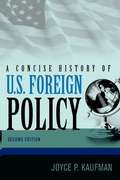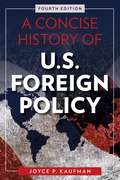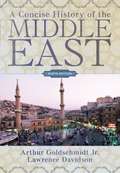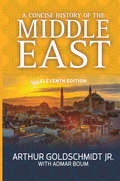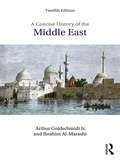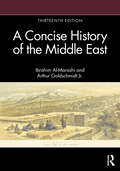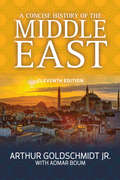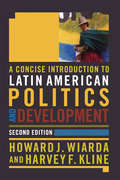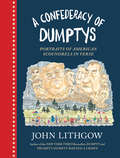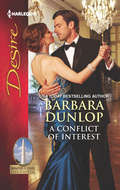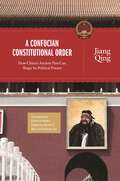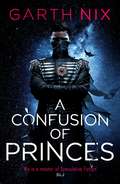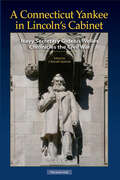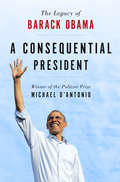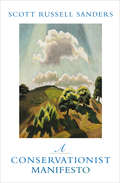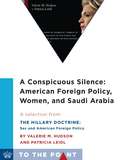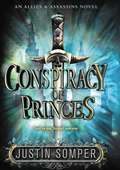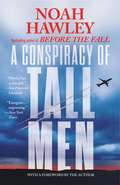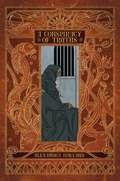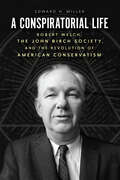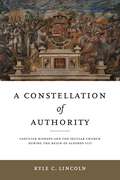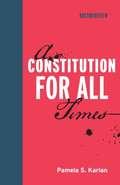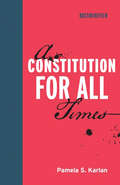- Table View
- List View
A Concise History of U.S. Foreign Policy
by Joyce P. KaufmanA Concise History of U. S. Foreign Policy offers a conceptual and historical overview of American foreign relations from the founding to the present. Joyce Kaufman clearly explains major themes in foreign relations and places the evolution of policy decisions within the context of the international situations and domestic priorities.
A Concise History of U.S. Foreign Policy
by Joyce P. KaufmanThe book focuses on the major actors involved in the making of foreign policy and the changing relationships among them. It also explains the major theoretical perspectives within international relations and places key foreign policy decisions within these frameworks. Kaufman concludes with a look forward to the challenges the United States will face in the coming decades. With its strong narrative and use of compelling case studies, the book engages students fully in this crucial topic, encouraging them to form their own ideas about American foreign policy.
A Concise History of the Middle East
by Lawrence Davidson Arthur Goldschmidt Jr.The ninth edition of this widely acclaimed text by Arthur Goldschmidt Jr. and Lawrence Davidson has been extensively revised to reflect the latest scholarship and the most recent events in the Middle East.<P><P> As an introduction to the history of this turbulent region from the beginnings of Islam to the present day, the book is distinguished by its clear style, broad scope, and balanced treatment. It focuses on the evolution of Islamic institutions and culture, the influence of the West, the modernization efforts of Middle Eastern governments, the struggle of various peoples for political independence, the course of the Arab-Israeli conflict, the reassertion of Islamic values and power, the issues surrounding the Palestinian Question, and the roles of Iraq and Iran in the post-9/11 Middle East. Nine maps newly commissioned for the ninth edition highlight key aspects of Middle East history. Two popular study aids, the chronology and the glossary, have been extensively revised, and the superlative bibliographic essay, an essential guide to further reading, has been thoroughly rewritten to reflect current scholarship.
A Concise History of the Middle East
by Arthur Goldschmidt Jr.An introduction to the history of this turbulent region from the beginnings of Islam to the present day, this widely acclaimed text by Arthur Goldschmidt Jr. is distinguished by its clear style, broad scope, and balanced treatment. This book explores the evolution of Islamic institutions and culture, the influence of the West, the modernization efforts of Middle Eastern governments, the struggle of various peoples for political independence, the Arab-Israeli conflict, the reassertion of Islamic values and power, the issues surrounding the Palestinian Question, and the post-9/11 Middle East.The eleventh edition has been fully revised to reflect the most recent events in, and concerns of, the region, including an expanded and more nuanced discussion of the "War on Terrorism" and the Arab uprisings, coverage of the rise of ISIS, and a new chapter on the growing environmental problems of the region. In addition, the authors have incorporated new scholarship on the early history to provide a fuller picture of the political shifts and socioeconomic concerns of that time. With updated bibliographical sketches, chronology and glossary, A Concise History of the Middle East remains an essential text for students of Middle East history.
A Concise History of the Middle East
by Arthur Goldschmidt Jr. Ibrahim Al-MarashiA Concise History of the Middle East provides a comprehensive introduction to the history of this turbulent region. Spanning from pre-Islam to the present day, it explores the evolution of Islamic institutions and culture, the influence of the West, modernization efforts in the Middle East, the struggle of various peoples for political independence, the Arab–Israel conflict, the reassertion of Islamic values and power, the issues surrounding the Palestinian Question, and the Middle East post-9/11 and post-Arab uprisings. The twelfth edition has been fully revised to reflect the most recent events in, and concerns of, the region, including the presence of ISIS and other non-state actors, the civil wars in Syria and Yemen, and the refugee crisis. New parts and part timelines will help students grasp and contextualize the long and complicated history of the region. With updated biographical sketches and glossary, and a new concluding chapter, this book remains the quintessential text for students of Middle East history.
A Concise History of the Middle East
by Ibrahim Al-Marashi Arthur Goldschmidt Jr.A Concise History of the Middle East provides a comprehensive introduction to the history of this region. Spanning from the pre-Islamic era to the present, it explores the evolution of Middle Eastern institutions and culture, the influence of European colonialism and Western imperialism, regional modernization efforts, the struggle of various peoples for political independence, the Arab–Israeli conflict, the reassertion of Islamist values and power, the issues surrounding the Palestinian Question, and the Middle East following 9/11, the 2011 Arab uprisings, and the regional crisis that erupted after 7 October 2023.The thirteenth edition has been fully revised to reflect the most recent events in, and concerns of, the region, including its future in the face of climate change and challenges in Iraq, and developments in the Israeli–Palestinian conflict. In addition, the important role of Middle Eastern women in the history of the region is woven into the narrative. New parts and part timelines will help students grasp and contextualize the long and complicated history of the region.With updated biographical sketches and a new concluding chapter, this book remains the quintessential text for students of Middle East history.
A Concise History of the Middle East: Eleventh Edition
by Arthur Goldschmidt Jr. Aomar BoumAn introduction to the history of this turbulent region from the beginnings of Islam to the present day, this widely acclaimed text by Arthur Goldschmidt Jr. is distinguished by its clear style, broad scope, and balanced treatment. This book explores the evolution of Islamic institutions and culture, the influence of the West, the modernization efforts of Middle Eastern governments, the struggle of various peoples for political independence, the Arab-Israeli conflict, the reassertion of Islamic values and power, the issues surrounding the Palestinian Question, and the post-9/11 Middle East. The eleventh edition has been fully revised to reflect the most recent events in, and concerns of, the region, including an expanded and more nuanced discussion of the "War on Terrorism" and the Arab uprisings, coverage of the rise of ISIS, and a new chapter on the growing environmental problems of the region. In addition, the authors have incorporated new scholarship on the early history to provide a fuller picture of the political shifts and socioeconomic concerns of that time. With updated bibliographical sketches, chronology and glossary, A Concise History of the Middle East remains an essential text for students of Middle East history.
A Concise Introduction to Latin American Politics and Development
by Howard J. Wiarda Harvey F. KlineThis succinct overview of the political factors that condition social and economic development in Latin America is the perfect core text in courses on politics, government, social change, and transitions to democracy throughout Latin America and the Caribbean.
A Confederacy of Dumptys: Portraits of American Scoundrels in Verse
by John LithgowThe next book in John Lithgow's New York Times bestselling seriesFollowing the success of New York Times bestsellers Dumpty and Trumpty Dumpty Wanted a Crown, award-winning actor, author, and illustrator John Lithgow presents the third book in his runaway hit series. A Confederacy of Dumptys takes us through a history of twenty-five "American Scoundrels" in this all-new collection of Lithgow's satirical poems and illustrations.While the Trump Era was rife with corruption and abuse of power, it was nothing new. Through Lithgow's cutting humor, you will read about a rogues' gallery of villains that came before Donald J. Trump, powerful men and women who were corrupt, venal, criminal, adulterous, racist, or just plain disgusting. With dark and lyrical stories from across American history, you will learn about long-forgotten figures and bad actors of today, including the first Grand Wizard of the Ku Klux Klan, the perpetrator of 19th century women's pyramid schemes, and participants in both the Watergate scandal and the Capitol insurrection. Trump and Nixon show up, of course, but also Leona Helmsley, Boss Tweed, Typhoid Mary, Newt Gingrich, Ted Cruz, and many more. Skipping through time, and delivered with classic Lithgow wit and style, A Confederacy of Dumptys is an exuberant reminder of how not to repeat history.Digital audio edition read by the author.The perfect book for:• Political satire fans—viewers of The Daily Show with Trevor Noah, Last Week Tonight with John Oliver, and The Late Show with Stephen Colbert.• American history buffs and trivia enthusiasts—readers of Jon's Stewart's America (The Book): A Citizen's Guide to Democracy Inaction and Josh Clark's Stuff You Should Know: An Incomplete Compendium of Mostly Interesting Things.• Poetry, art, and illustration aficionados.
A Conflict of Interest
by Barbara DunlopShe tried to stay away from him....More than once, White House PR specialist Cara Cranshaw has considered that reporter Max Gray might want her only because he can't have her. Given their work, a relationship is dicey-and impossible now that the president has taken office.For Max, their relationship may be a lark, a fling-maybe she's just another woman in the long line that forms a part of his bachelor lifestyle. But for her, what they have is different. She's all but given him her heart. And now she is having his baby.
A Confucian Constitutional Order: How China's Ancient Past Can Shape Its Political Future (The Princeton-China Series #4)
by Jiang QingWhat a Confucian constitutional government might look like in China's political futureAs China continues to transform itself, many assume that the nation will eventually move beyond communism and adopt a Western-style democracy. But could China develop a unique form of government based on its own distinct traditions? Jiang Qing—China's most original, provocative, and controversial Confucian political thinker—says yes. In this book, he sets out a vision for a Confucian constitutional order that offers a compelling alternative to both the status quo in China and to a Western-style liberal democracy. A Confucian Constitutional Order is the most detailed and systematic work on Confucian constitutionalism to date.Jiang argues against the democratic view that the consent of the people is the main source of political legitimacy. Instead, he presents a comprehensive way to achieve humane authority based on three sources of political legitimacy, and he derives and defends a proposal for a tricameral legislature that would best represent the Confucian political ideal. He also puts forward proposals for an institution that would curb the power of parliamentarians and for a symbolic monarch who would embody the historical and transgenerational identity of the state. In the latter section of the book, four leading liberal and socialist Chinese critics—Joseph Chan, Chenyang Li, Wang Shaoguang, and Bai Tongdong—critically evaluate Jiang's theories and Jiang gives detailed responses to their views.A Confucian Constitutional Order provides a new standard for evaluating political progress in China and enriches the dialogue of possibilities available to this rapidly evolving nation. This book will fascinate students and scholars of Chinese politics, and is essential reading for anyone concerned about China's political future.
A Confusion of Princes
by Garth NixPrince wants to become Emperor and the surest way to do so is to kill, dishonor, or sideline any potential competitor. There are rules, but as Khemri discovers, rules can be bent and even broken.
A Connecticut Yankee in Lincoln's Cabinet: Navy Secretary Gideon Welles Chronicles the Civil War
by Gideon WellesThe U.S. Civil War through the eyes of a key member of President Abraham Lincoln’s cabinet.Gideon Welles, the Connecticut journalist-politician who served as Lincoln’s secretary of the navy, was not only an architect of Union victory but also a shrewd observer of people, issues, and events. Fortunately for posterity, he recorded many of his observations in his extensive diary. A Connecticut Yankee in Lincoln’s Cabinet brings together 250 of the most important and interesting excerpts from the diary, dealing with topics as varied as the issuance of the Emancipation Proclamation, the Marine Band’s concerts in Washington’s Lafayette Square, Lincoln’s sense of humor, rivalries among cabinet members, Welles’s often caustic opinions of prominent politicians and military leaders, demands for creation of a navy yard in his home state, the challenge of blockading 3,500 miles of Confederate coastline, the struggle against rebel commerce raiders, the battles of Antietam and Gettysburg, the Fort Pillow massacre of African American troops, and Lincoln’s assassination. Together, the excerpts provide a candid insider’s view of the Civil War as it unfolded, and an introduction provides the reader with context. Published by the Acorn Club.
A Consequential President: The Legacy of Barack Obama
by Michael D'AntonioBarack Obama was once a most unlikely candidate, but his successful campaign for the White House made him a worldwide sensation and a transformative figure even before he was inaugurated. Elected as the Iraq War and the Great Recession had discouraged millions of Americans, Obama made a promise of hope that revived the national spirit. Soon after he occupied the White House, Congress approved his economic-recovery act and his program to save the U.S. auto industry. Both worked better than any observer predicted, and together they powered a recovery that has seen growth return and unemployment reduced to below five percent. Today the American economy is again the most vibrant in the world and its recovery has far outpaced Western Europe's. Had he only saved the U.S. economy, Barack Obama would be considered a truly successful president. However, he has achieved so much more, against ferocious opposition---including some who challenged his claim to being an American citizen---that he can be counted as one of the most consequential presidents in history. With health care reform he ended a long-running crisis of escalating costs and inadequate access of treatment that threatened the well-being of 50 million people. His energy policies drove down the cost of power generated by the sun, the wind, and even fossil fuels. His efforts on climate change produced the first treaty to address global warming in a meaningful way---the Paris Agreement---and his diplomacy produced a dramatic reduction in the nuclear threat posed by Iran. Add the withdrawal of troops from Iraq, the normalization of relations with Cuba, and his “pivot” toward Asia, and Obama's successes abroad match those at home.In A Consequential President, Michael D'Antonio tallies President Obama’s long record of achievement, recalling both his major successes and less-noticed ones that nevertheless contribute to his legacy. The record includes Obama's role as a inspirational leader who was required to navigate race relations as the first black president and had to function in an atmosphere that included both racial acrimony from his critics and unfair expectations among supporters. In light of these conditions, Obama's greatest achievement came as he restored dignity and ethics to the office of the president, and serve as proof that he has delivered the hope and the change he promised eight years before.
A Conservationist Manifesto
by Scott Russell Sanders&“Eloquent . . . a must-read for anyone committed to taking care of the natural world and passing it along to future generations&” (ForeWord). As an antidote to the destructive culture of consumption dominating American life today, Scott Russell Sanders calls for a culture of conservation that allows us to savor and preserve the world, instead of devouring it. How might we shift to a more durable and responsible way of life? What changes in values and behavior will be required? Ranging from southern Indiana to the Boundary Waters Wilderness, and from billboards to the Bible, Sanders&’s 40-point blueprint for ecological health extends the visions of Henry David Thoreau, John Muir, and Rachel Carson to our own day. A Conservationist Manifesto shows the crucial relevance of a conservation ethic at a time of mounting concern about global climate change, depletion of natural resources, extinction of species, and the economic inequities between rich and poor nations. The important message of these &“original and intriguing&” essays is that conservation is not simply a personal virtue but a public one (Publishers Weekly). &“A book to be savored—for its language, its stories, its sense of place, and for how it reminds us of the profound relationships with nature and each other that can inspire us to change how we live on this planet.&” —Will Rogers, President, The Trust for Public Land
A Conservative Environmentalist: The Life and Career of Frank Masland Jr.
by Thomas G. SmithA wealthy textile titan from Carlisle, Pennsylvania, Frank Masland Jr. was an ardent political conservative and an equally fervent conservationist who was well known and highly respected in the mid-twentieth-century environmental preservation community. This eye-opening biography charts Masland’s life work, telling the story of how he and fellow Republicans worked with Democrats to expand the national park system, preserve wild country, and protect the environment. Though a conservative conservationist appears to be a contradiction in terms today, this was not necessarily the case when Masland and his compatriots held sway. Conservatives, Masland insisted, had a duty to be good stewards of the earth for present and future generations, and they worked closely with members of both parties in Congress and nonpolitical conservation groups to produce landmark achievements. When conservatives turned against environmentalism during the Reagan presidency, Masland refused to join what historians have termed the “Republican reversal.” During his long life of nearly a hundred years, Masland used his voice, influence, experiences with nature, and considerable wealth to champion environmental causes at the national, state, and local levels. Engaging, informative, and at times eyebrow-raising, this portrait of a passionately anti-statist nature-loving Republican environmentalist documents the history of the twentieth-century conservation movement and reminds us of a time when conservative Republicans could work with liberal Democrats to protect the environment.
A Conspicuous Silence: A Selection from The Hillary Doctrine: Sex and American Foreign Policy
by Valerie M. Hudson Patricia LeidlHillary Rodham Clinton was the first to clearly state that: "the subjugation of women is a direct threat to the security of the United States." This declaration has come to be known as the Hillary Doctrine, and it was formally incorporated into the first Quadrennial Diplomatic and Development Review of U.S. foreign policy in 2010. If the Hillary Doctrine is justified, then how is it that Secretary of State Clinton never addressed issues of extreme gender inequality in Saudi Arabia? And how has Saudi Arabia sought to export that inequality to other states, such as Yemen? This chapter explores the complexities of the Hillary Doctrine in practice, the realities of pursuing gender equality on the national stage, the strategies Clinton and those working under her innovated to introduce gender issues diplomatically into a resistant country, and other key developments from this encounter and its reverberations across international channels.
A Conspicuous Silence: Sex and American Foreign Policy
by Patricia Hudson Valerie M. LeidlHillary Rodham Clinton was the first to clearly state that: "the subjugation of women is a direct threat to the security of the United States." This declaration has come to be known as the Hillary Doctrine, and it was formally incorporated into the first Quadrennial Diplomatic and Development Review of U.S. foreign policy in 2010. If the Hillary Doctrine is justified, then how is it that Secretary of State Clinton never addressed issues of extreme gender inequality in Saudi Arabia? And how has Saudi Arabia sought to export that inequality to other states, such as Yemen? This chapter explores the complexities of the Hillary Doctrine in practice, the realities of pursuing gender equality on the national stage, the strategies Clinton and those working under her innovated to introduce gender issues diplomatically into a resistant country, and other key developments from this encounter and its reverberations across international channels.
A Conspiracy of Princes (Allies & Assassins #2)
by Justin SomperThe newly crowned Prince Jared, ruler of All Archenfield, has inherited a kingdom in crisis. The murder of his older brother has revealed a traitorous plot in his court, calling into question who, if anyone, Jared can trust as he ascends the throne. Now the realm is on the brink of invasion from the brutal princes of Paddenburg and Jared must travel to neighboring kingdoms in search of allies to defend his throne. Little does he know that an even more dangerous plot is hatching in the Archenfield court--one that threatens to remove Jared from power. One put in motion by the very people he left in charge.The second book in Justin Somper's Allies & Assassins series delivers another twisted tale of high-stakes betrayal and political machinations set amid a lush medieval background.
A Conspiracy of Tall Men
by Noah HawleyLinus Owen is a young professor of conspiracy theory at a small college just outside San Francisco. His marriage is foundering and his wife, Claudia, has gone to Chicago to visit her mother. But if Claudia is in Chicago, how is it that two FBI agents show up at Linus' office and inform him that Claudia has been killed in a plane crash on her way from New York to Brazil? And why did a man named Jeffrey Holden, the vice president of a major pharmaceutical company, buy her ticket and die beside her? Enlisting the aid of two fellow conspiracy theorists, Linus heads across the country in search of answers. But as their journey progresses, it becomes frighteningly clear they've left the realm of the academic and are tangled up in a dangerous, multilayered cover-up. Finally, deep in the heart of the American desert, stunned by an ominous revelation, Linus sees he has a new mission: to try to stay alive. Part Don DeLillo, part Kurt Vonnegut, with writing that is electric, whip-smart and suspenseful at each turn, Noah Hawley draws us into a deliciously labyrinthine world of paranoia and plots.
A Conspiracy of Truths
by Alexandra RowlandA wrongfully imprisoned storyteller spins stories from his jail cell that just might have the power to save him—and take down his jailers too. Arrested on accusations of witchcraft and treason, Chant finds himself trapped in a cold, filthy jail cell in a foreign land. With only his advocate, the unhelpful and uninterested Consanza, he quickly finds himself cast as a bargaining chip in a brewing battle between the five rulers of this small, backwards, and petty nation. Or, at least, that's how he would tell the story. In truth, Chant has little idea of what is happening outside the walls of his cell, but he must quickly start to unravel the puzzle of his imprisonment before they execute him for his alleged crimes. But Chant is no witch—he is a member of a rare and obscure order of wandering storytellers. With no country to call his home, and no people to claim as his own, all Chant has is his wits and his apprentice, a lad more interested in wooing handsome shepherds than learning the ways of the world. And yet, he has one great power: his stories in the ears of the rulers determined to prosecute him for betraying a nation he knows next to nothing about. The tales he tells will topple the Queens of Nuryevet and just maybe, save his life.
A Conspiratorial Life: Robert Welch, the John Birch Society, and the Revolution of American Conservatism
by Edward H. Miller“A cleverly written, finely textured, and badly needed study of a pivotal and too-often marginalized figure in the development of the modern American Right.” —The Journal of Southern History Though you may not know his name, Robert Welch (1899-1985)—founder of the John Birch Society—is easily one of the most significant architects of our current political moment. In A Conspiratorial Life, the first full-scale biography of Welch, Edward H. Miller delves deep into the life of an overlooked figure whose ideas nevertheless reshaped the American right.A child prodigy who entered college at age twelve, Welch became an unlikely candy magnate, founding the company that created Sugar Daddies, Junior Mints, and other famed confections. In 1958, he funneled his wealth into establishing the organization that would define his legacy and change the face of American politics: the John Birch Society. Though the group’s paranoiac right-wing nativism was dismissed by conservative thinkers like William F. Buckley, its ideas gradually moved from the far-right fringe into the mainstream. By exploring the development of Welch’s political worldview, A Conspiratorial Life shows how the John Birch Society’s rabid libertarianism—and its highly effective grassroots networking—became a profound, yet often ignored or derided influence on the modern Republican Party. Miller convincingly connects the accusatory conservatism of the midcentury John Birch Society to the inflammatory rhetoric of the Tea Party, the Trump administration, Q, and more. As this book makes clear, whether or not you know his name or what he accomplished, it’s hard to deny that we’re living in Robert Welch’s America.“Offers a good angle from which to appraise the fractured state of American conservatism.” —Financial Times
A Constellation of Authority: Castilian Bishops and the Secular Church During the Reign of Alfonso VIII (Iberian Encounter and Exchange, 475–1755)
by Kyle C. LincolnDuring the long reign of Alfonso VIII, Castilian bishops were crusaders, castellans, cathedral canons, and collegiate officers, and they served as powerful intermediaries between the pope and the king of Castile. In A Constellation of Authority, Kyle C. Lincoln traces the careers of a septet of these bishops and uses this history to fill in much of what really happened in thirteenth-century Castile.The relationships that local prelates cultivated with Alfonso VIII and the Castilian royal family existed in tension with how they related to the reigning pope. Drawing on diocesan archives, monastic collections, and chronicles, Lincoln reconstructs the complex negotiations and navigations these bishops undertook to maintain the balance among the papal and royal agendas and their own interests. Lincoln examines the bishops' ties to crusades and political influence, the growth of canon and Roman law, religious and church reform, and the canonization of local leaders. In the process, he makes the case that the medieval past is best illuminated by the combined luminescence of a “constellation of authority” represented, at least in part, by a conglomerate of bishops.Through seven case studies, each examining a prelate in his individual historical context, A Constellation of Authority improves our understanding of the politics of thirteenth-century Castile and provides an important foundation for further consideration of the ties between Castile and the broader European medieval world. It will appeal to medieval Hispanists and historians of the medieval church and episcopacy.
A Constitution for All Times
by Pamela S. KarlanPamela S. Karlan is a unique figure in American law. A professor at Stanford LawSchool and former counsel for the NAACP, she has argued seven cases at the Supreme Court and workedon dozens more as a clerk for Justice Harry Blackmun. In her first book written for a generalaudience, she examines what happens in American courtrooms -- especially the Supreme Court -- andwhat it means for our everyday lives and to our national commitments to democracy, justice, andfairness. Through an exploration of current hot-button legal issues -- fromvoting rights to the death penalty, health care, same-sex marriage, invasive high-tech searches, andgun control -- Karlan makes a sophisticated and resonant case for her vision of the Constitution. Atthe heart of that vision is the conviction that the Constitution is an evolving document thatenables government to solve novel problems and expand the sphere of human freedom. As skepticscharge congressional overreach on such issues as the Affordable Care Act and even voting rights,Karlan pushes back. On individual rights in particular, she believes the Constitution allowsCongress to enforce the substance of its amendments. And she calls out the Roberts Court for itsdisdain for the other branches of government and for its alignment with a conservativeagenda.
A Constitution for All Times (Boston Review Books)
by Pamela S. KarlanA prominent lawyer and legal scholar describes her vision of an evolving Constitution, examining current legal issues that range from health care to gun control.Pamela S. Karlan is a unique figure in American law. A professor at Stanford Law School and former counsel for the NAACP, she has argued seven cases at the Supreme Court and worked on dozens more as a clerk for Justice Harry Blackmun. In her first book written for a general audience, she examines what happens in American courtrooms—especially the Supreme Court—and what it means for our everyday lives and to our national commitments to democracy, justice, and fairness. Through an exploration of current hot-button legal issues—from voting rights to the death penalty, health care, same-sex marriage, invasive high-tech searches, and gun control—Karlan makes a sophisticated and resonant case for her vision of the Constitution. At the heart of that vision is the conviction that the Constitution is an evolving document that enables government to solve novel problems and expand the sphere of human freedom. As skeptics charge congressional overreach on such issues as the Affordable Care Act and even voting rights, Karlan pushes back. On individual rights in particular, she believes the Constitution allows Congress to enforce the substance of its amendments. And she calls out the Roberts Court for its disdain for the other branches of government and for its alignment with a conservative agenda.
